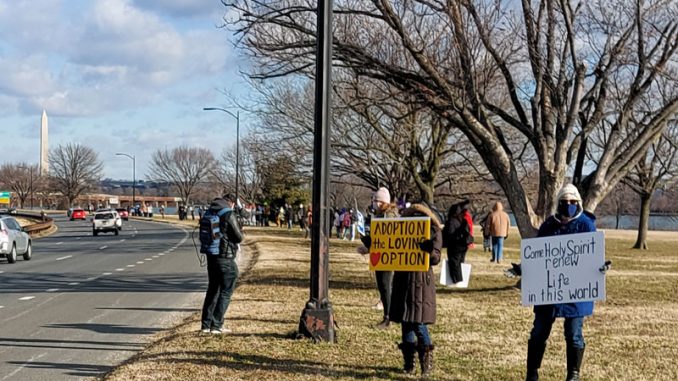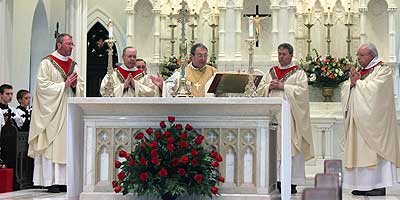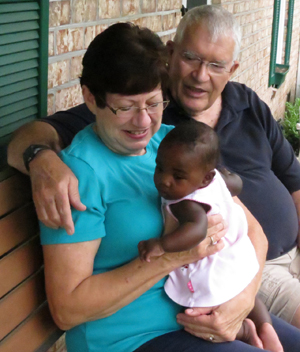
DIOCESE—There was no trip planned to Washington, D.C., this year for the annual March for Life rally. No caravans from various parishes drove up to our nation’s capital. No local Catholic high school students got to experience the thrill of seeing thousands of people gathered together, praying for the right to human life.
This year was different. In light of the pandemic and security measures enforced in and around the Capitol, this year’s March for Life took place virtually. There was a small group of pro-life leaders that marched, but nothing like the thousands of individuals that gather each year — since 1973 in fact.
But, fear not! Locally, the pro-life message was heard loud and clear on Jan. 29.
Father Rhett Williams has been to the March for Life in Washington, D.C., for the past 10 years. Currently, he is Chaplain at the University of South Carolina and Cardinal Newman School, as well as the administrator for St. Thomas More, the heart of campus ministry in Columbia. Normally, he caravans with students up to the March for Life.
This year he and 15 USC students attended the Mass for Unborn Children on Jan. 22, celebrated by Bishop Robert E. Guglielmone. And on Friday, Jan. 29, he said the students at Cardinal Newman watched the National March for Life online.
“We did what we could. We hope to return bigger and better next year in Washington,” he said.
According to Father Williams, all was not lost.
“This forced us to realize that not everyone can go in person and streaming all the pieces like this is something we should continue to do in the future,” he said.
Joan LaBone, youth director at St. Mary Help of Christians in Aiken, echoed Father Williams’ sentiment.
LaBone has attended the rally in Washington, D.C., every year since 2006. Usually she takes the parish middle school students to the state rally in Columbia and the high school students to the national rally.
This year, the virtual experience was more intimate, but LaBone said the students were able to express their feelings more about what it means to be pro-life in a smaller group setting.
“We dove into the issues of life and what valuing life really means. It was powerful. Just in a different way,” she said.
Cecil Stanford, a parishioner with Our Lady of Grace Church in Lancaster, has always been involved in the pro-life movement. In fact, before she moved to South Carolina, she worked for 10 years in a Birthright office in Michigan. On Jan. 29, she was glued to the national march on TV, listening to pro-life leaders speak, and was inspired to continue her involvement here.
“I will be donating to the St. Clare’s Home, a maternity home in Greenville, and I encourage others to do so as well,” she said.
Alex Palyo said he would like to see more people support the pro-life movement on the local level as well. Founder of Pro-life Charleston, he has been marching for life in Washington for over 30 years. This year, he organized a group to pray outside Planned Parenthood on Jan. 29.
“We said the rosary for the first hour and the second hour we prayed and listened to speakers,” he said.
As for the local Catholic high schools, usually they all send groups to the national march.
This year, teens from Bishop England in Charleston, St. Elizabeth Ann Seton in Myrtle Beach, and Cardinal Newman in Columbia, prayed the novena in the days leading up to the march. At John Paul II in Ridgeland, campus ministry organized a Respect Life Day of Adoration.
Valerie Baronkin, the Respect Life Coordinator of the Greenville Deanery and a parishioner of St. Mary Magdalene in Simpsonville, was one of the few who did make it up to Washington.
She participated in a life chain at a park in Arlington, Va., just outside the nation’s capital, with about 300 other people. She has been attending the National March for Life events since 1991, and typically helps plan the caravans of people that travel from the diocese.
This year, there were no caravans of people from South Carolina, and Baronkin said the life chain had significantly less people.
“When you are used to seeing tens of thousands of pro-life supporters, 300 for the life chain seemed low,” she said. But on a positive note, she was happy that more people had access to the events online.
“In that sense, perhaps we had an even greater reach with our message,” she hoped.
The next big event will be 40 Days for Life, which begins on Feb. 17, Ash Wednesday, and runs through March 28, Palm Sunday.



